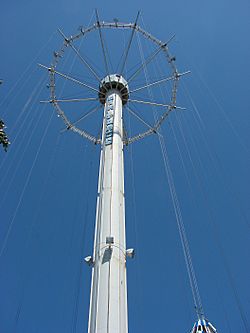Texas Chute Out facts for kids
Quick facts for kids Texas Chute Out |
|||||||||||||
|---|---|---|---|---|---|---|---|---|---|---|---|---|---|
 |
|||||||||||||
|
|||||||||||||
| Ride statistics | |||||||||||||
| Manufacturer | Intamin | ||||||||||||
| Model | Parachute Drop | ||||||||||||
| Height | 200 ft (61 m) | ||||||||||||
| Capacity | 1500 riders per hour | ||||||||||||
| Vehicle type | Parachute | ||||||||||||
| Vehicles | Parachutes | ||||||||||||
Texas Chute Out was a 200-foot-tall (61 m) Intamin "parachute drop" ride that operated at Six Flags Over Texas. It closed on September 3, 2012.
History
When Texas Chute Out opened in 1976, the ride was a major engineering innovation at the park dominating the entrance to the parking lot. The ride was derived from the famed Parachute Jump ride at the legendary Coney Island in New York. Ride engineers from Intamin developed the ride, and then Six Flags purchased three Parachute Drop rides with two built at Six Flags Over Georgia and Six Flags Over Mid-America (now Six Flags St. Louis).
Texas Chute Out was the world’s first and known as a “modern” parachute drop ride when it opened in 1976.
During Holiday in the Park, Texas Chute Out was decorated as a giant Christmas tree.
On August 2, 2012, Six Flags Over Texas announced the last chance to ride Texas Chute Out would be on September 3, 2012, before it closed along with the neighboring ride Flashback. Texas Chute Out was replaced by Texas SkyScreamer, a 400-foot (120 m) Funtime StarFlyer. Texas Chute Out was demolished on October 10, 2012 to make room for construction of the Texas SkyScreamer.
Ride
Texas Chute Out was located in Goodtimes Square, where riders of one to three, strap themselves onto to the bench where it then lifted riders to the top 200 feet or 61 metres. Once up top, the ride pauses to give riders a Bird's-eye view of the park and the Dallas–Fort Worth metroplex. After a couple of seconds the parachute then releases from the top and floats back down toward the ground.
Each seat held two riders, and was equipped with a seat belt and restraint bar. Stationary cables kept each chute stabilized and in the correct position. Another cable actually moved the seat vertically. Inside the tower was one counterweight for each chute. During the years, the ride allowed riders to stand during the ride, but this later stopped.

